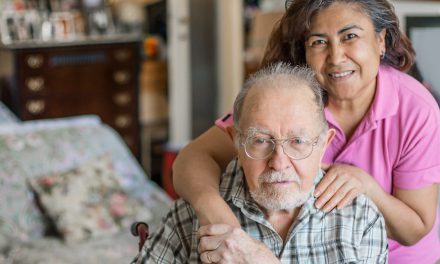Trauma exposure is linked to developing a wide range of conditions that negatively impact physical, mental, and cognitive health. Because of this, experts argue that trauma-informed care is vital to improving and maintaining individuals’ health and well-being, especially for older adults.
The 5th Annual Older Adult Mental Health Awareness Day Symposium featured several presentations and breakout sessions to raise awareness of older adult mental health. The event, co-sponsored by the U.S. Administration for Community Living (ACL), the Health Resources and Services Administration (HRSA), and the Substance Abuse and Mental Health Services Administration (SAMHSA), covered topics such as trauma-informed care, suicide prevention, substance use in older adults, and more.
A Look at Trauma-Informed Care, presented by Lisa Brown, PhD, ABPP, Leah Bergen Miller, and Lily Liu explored the link between trauma and health. Dr. Brown, a professor at Palo Alto University, and Bergen Miller, associate director of the Center on Holocaust Survivor Care and Institute on Aging and Trauma, outlined best practices for providers to begin implementing trauma-informed approaches. Their presentations were underscored by the lived experiences shared by Liu, a family caregiver, regarding her Chinese heritage and the impact of racial trauma on her family and their health.
Understanding Trauma and Health in Older Adults
According to SAMHSA, trauma results from an event, series of events, or set of circumstances that is experienced by an individual as physically or emotionally harmful or life-threatening and that has lasting adverse effects on the individual’s functioning and mental, physical, social, emotional, or spiritual well-being.
Examples of adverse effects include the inability to cope with normal stressors, inability to trust or benefit from relationships and social support that may have been helpful previously, difficulties with memory and attention, and difficulty regulating behavior or controlling expressions of emotions, among others.
People who have experienced trauma may try to avoid people, places, or things that are triggering or remind them of the traumatic event. They also may look to numb themselves as a means of coping, sometimes leading to substance misuse, to avoid overwhelming or painful feelings. Adverse effects of trauma, such as isolation, substance misuse, and a lack of self-care – both physical and emotional – can directly contribute to negative health outcomes.
According to Bergen Miller, trauma exposure has been associated with physical health, mental health, and cognitive health issues, including dementia in older adults.
This link between trauma and health is especially important for older adults to address as a number of later-life experiences can cause trauma that may not be recognized as such. These experiences include but aren’t limited to changes of familial roles, beginning of retirement, emergence of health problems, loss of independence, loss of loved ones, and changes in coping mechanisms.
“Maybe you were the primary caretaker and decision-maker and now that role has switched to somebody else,” Bergen Miller said. “In retirement, maybe you had thrown yourself into work and now you may not have that as a distraction anymore, or you may have lost your sense of purpose when you stopped working.”
As adults age, the loss of independence can be especially traumatizing. Relying on independence may have been a survival skill and the loss of that skill set, especially cognitive functions, can be triggering. Though driving, exercising, or social outings may have once been healthy coping methods, these may also no longer be an option. The loss of routine activity, independence, and healthy coping skills can lead to substance misuse, contributing to any other existing health concerns.
Older adults are also at high risk of substance misuse and other health concerns after the loss of a loved one. Losing a family member or spouse can impact an individual emotionally as well as financially. An individual’s financial status changing may create new problems and the isolation due to grief can cause a change in social status as well.
Though the need for trauma recognition in older adults has always been important, the overwhelming loss of lives to COVID-19 is guaranteed to make an unprecedented impact on our nation’s collective mental health. It is especially important now and in the years following this pandemic that providers are cognizant of COVID-19’s impact in terms of grief and mental health, as well as the lasting physical effects.
Trauma-Informed Care: A Blueprint
According to SAMHSA, there is an increasing focus on the impact of trauma and how service systems may help to resolve or exacerbate trauma-related issues. A successful trauma-informed approach requires the four R’s:
- Realize the prevalence of trauma.
- Recognize how trauma affects all ages of individuals.
- Respond by putting this knowledge into practice.
- Resist re-traumatization with routine assessment and evaluation of your processes and outcomes.
“In all settings, the general approach taken is not, ‘What is wrong with you?’ – Rather, people are asked to share, “What happened to you?” Dr. Brown said. “A person’s symptoms are their efforts to cope in response to having experienced a significant traumatic event.”
Many barriers already exist for individuals, especially older adults, in need of health and social care: transportation gaps, lack of affordable insurance, economic insecurity, stigma surrounding mental health and substance use, decline in cognitive function, loss of independence, among others. Approaching symptoms of possible trauma in a way that places blame on the individual, rather than recognizes their lived experiences, can further prevent people from seeking care.
Trauma-informed care is both a provider approach and an organizational structure that involves understanding, recognizing, and responding to the effects of trauma. A main component of trauma-informed care is emphasizing the physical, psychological, and emotional safety of both providers and the people they serve.
“Providers aren’t necessarily mental health clinicians, they can be people who are working with anyone who is basically living and experienced some type of trauma,” Dr. Brown said. “I don’t think it’s necessarily defined by age or race or setting. I think it’s a very important approach that can be used in numerous settings.”
According to Dr. Brown, there are six key principles of a trauma-informed approach:
- Safety.
- Trustworthiness and transparency.
- Peer support.
- Collaboration and mutuality.
- Empowerment, voice, and choice.
- Cultural, historical, and gender issues.
Developing an effective trauma-informed approach requires change at multiple levels of an organization, as well as a systematic alignment with the six key principles. Trustworthiness and transparency are an especially vital part of these multi-level changes. “Overall, organizations should strive for building and maintaining trust with the people they serve and among their staff,” Dr. Brown said.
Changes in transparency can include publicizing rights and responsibilities, making clear contracts and setting specific time frames that are followed through on, and acknowledging inconsistencies with policies and outcomes. “People will feel institutional betrayal if your policies don’t align with your promises,” Dr. Brown said. “Trauma-informed care works if people feel connected, valued, informed, and hopeful of their recovery.”
By identifying and acknowledging links between health symptoms and trauma, providers can offer empathetic and person-centered care that more effectively treats and manages these symptoms. This approach also provides an opportunity to discuss healthy changes in behavior and coping methods, as well as identifying other areas where support may be needed.
Trauma-Informed Care Outside Hospital Walls
Education about trauma-informed approaches is not confined to the four walls of a care facility. Dr. Brown argues that it is merely a first step that opens the door for better care everywhere, including in traumatic situations as they’re happening.
“I think that trauma-informed care – having that orientation, taking that position – is really critically important and a really valuable first step,” she said. “But I think it’s equally important for us to consider having more people trained to be able to deliver psychological first aid (PFA) and mental health first aid (MHFA).”
In the example she provided, at horrific events like the 2013 Boston marathon bombing and 2017 Las Vegas concert shooting, present staff were prepared and equipped to provide medical and psychological care in the case of a catastrophe, which they unfortunately both turned out to be.
However, in events like the 2022 Buffalo supermarket shooting or the 2022 Laguna Woods church shooting, where the attack happened in a local facility rather than a large-scale event, it is less likely that there were people nearby with that level of medical, PFA, or MHFA training.
Generally speaking, medical first aid knowledge is widely known, such as how to put a band-aid on or stop a bleed, as well as when to call for emergency assistance. Dr. Brown believes PFA and MHFA training could equip individuals and their communities with better immediate care during a traumatic event.
“What [first aid] does is either you’re able to treat it successfully at home and don’t need additional care or you’re able to treat it sufficiently until additional care can be provided,” she said. “The same thing holds true with PFA and MHFA. I’m arguing that when people are learning physical first aid, they should be learning PFA and MHFA as well.”
SAMHSA addresses the impact of trauma on individuals, families, and communities as a behavioral health concern that requires a healing and recovery process.
Learn more about this presentation and more sessions from the 5th Annual Older Adult Mental Health Awareness Day Symposium.
June is Alzheimer’s and Brain Awareness Month
Following Older Americans Month, celebrated annually in May, is Alzheimer’s and Brain Awareness Month. Each June, the Alzheimer’s Association leads the fight to raise awareness of Alzheimer’s and dementia in older adults and provides opportunities to join and support their mission.
According to the Alzheimer’s Association, many older adults – including 55% of Black Americans and 57% of Hispanic Americans — believe cognitive decline is a natural part of aging. This often causes families to delay seeking treatment until conditions worsen. However, cognitive decline and loss of certain functions can be symptoms of dementia, trauma, or a combination of the two. Learn more about the early warning signs of dementia.
An early diagnosis of dementia can lead to extended independence and comfort, as well as prepare affected individuals, their family members, and their caregivers for the changes that will occur. The Customized Caregiver Training and Relief Program offers customized emotional support and financial relief for adults with dementia and their support systems.
A Care Consultation addresses unmet needs and links caregivers to resources and support. Individuals do not need a confirmed diagnosis of dementia to enroll; families are encouraged to call with any questions regarding dementia and dementia care, even if they are not ready to enroll in the program at this time. Learn more about program details and eligibility.








